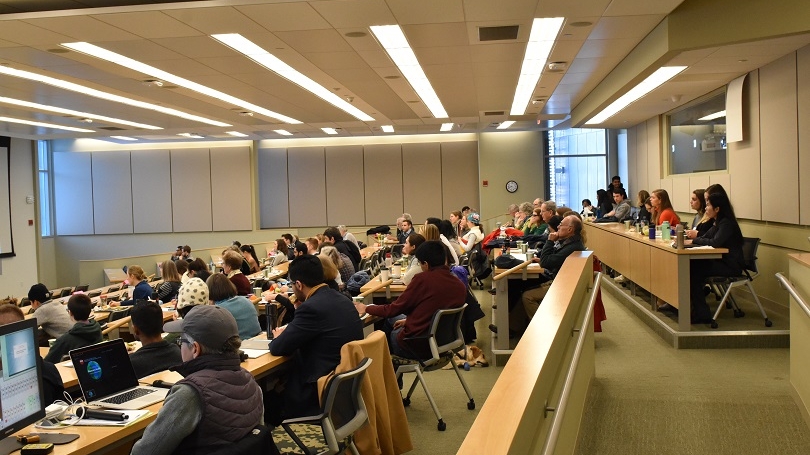
- Public Policy
- Leadership
- Funding
- News & Events
- About the Center
Back to Top Nav
Back to Top Nav
Back to Top Nav
Back to Top Nav
Rockefeller Center Mini-Grant recipient, Arvind Suresh '19 was part of the planning committee for the 7th Annual Physicians for Human Rights (PHR) conference, which aims to look at the intersection of human rights with health issues each year. This year's theme was Planetary Health. The following is a recap of Arvind's experience at the conference.
In an era where humans are becoming increasingly interconnected to the environment, we must think more broadly about the implications of changes in the environment and how they impact our health and quality of life. This interdependence between humans, animals, and the environment has spurned a new field called Planetary Health, which was first defined by the Lancet in 2015 as “the achievement of the highest attainable standard of health, wellbeing, and equity worldwide through judicious attention to the human systems… that shape the future of humanity and the Earth’s natural systems.”
During our conference, we had an opportunity to explore this field from multiple perspectives and see how changes to the environment have a wide spectrum of effects that are deeply interconnected with the fate of human health. As climate change has affected the suitable geographies for disease vectors such as ticks and mosquitoes, we have begun to see changes in infectious disease patterns as they move to new areas. New research from Dr. Sam Myers on the effects of rising carbon dioxide concentrations in our atmosphere has also brought to attention changes in global nutritional content that have led to growing iron and zinc deficiencies in our crops. While the conference as a whole allowed us to explore the key impacts of planetary health, the workshops encouraged a problem-solving mindset that allowed attendees to brainstorm possible solutions to these seemingly intractable and large-scale changes. In a workshop on Energy, Health, and Policy led by Anant Sundaram from the Tuck School of Business and Amanda Graham from the Irving Institute for Energy and Society, we saw that merely replacing fossil fuels with clean energy is only going to exacerbate problems for the energy poor and make it more difficult for them to stay healthy. While we brainstormed solutions that included a greater reliance on nuclear and hydropower, the workshops allowed us to comprehend the wide array of factors involved in planetary health and envision solutions that address the root of the problem rather than creating a diversion or temporary solution.
In addition to exploring the impacts of environmental change on health, we also interspersed several case study discussions into our conference program to put the larger issues into context and bring a human-rights approach to examining planetary health. In a keynote session on Arctic Health and Wellness, Director of Arctic Studies Ross Virginia and Director of the Global Health Initiative at the Dickey Center Anne Sosin explored the effects of climate change on Arctic Health, using their own experiences in the region as guide to help us understand the real impact that a rising climate has on communities in the Arctic. The use of a human-rights framework to address these issues was certainly an important part of the conference, as it grounded the broader themes and the bird’s eye view of the interconnectedness between human health and the environment with the real dangers and urgency associated with environmental change if we do not act now.
Organizing this conference as part of the Nathan Smith Society was a great opportunity for us to collaborate and work together with medical students from the Geisel Chapter of Physicians for Human Rights to address problems that will affect the health and well-being of current and future generations. As the Nathan Smith Society is the main student organization for undergraduates interested in the health professions, planning this conference with Geisel students allowed for a very meaningful and multidisciplinary conference in which students could hear about health from many different perspectives and voices represented by a wide array of Arts & Sciences departments as well as graduate schools. This conference would not have been possible without broad support from many on-campus departments, groups, and centers, and we hope that this conference inspired many others in the Dartmouth community to address these challenges in our future.
~Written by Rockefeller Center Mini-Grant recipient, Arvind Suresh '19.
The Rockefeller Center's Mini-Grants program funds registration fees for students attending conferences, as well as the costs of bringing guest speakers to Dartmouth. The views and opinions expressed here are the author’s own and do not necessarily represent the views and opinions of the Rockefeller Center or constitute an endorsement by the Center.